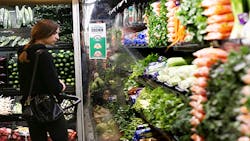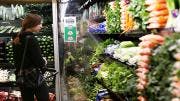Whole Foods launches Responsibly Grown system
Whole Foods Market (Nasdaq: WFM) has launched Responsibly Grown, a tiered produce rating system that assesses growing practices that impact human health and the environment.
The new rating system labels fresh fruits, vegetables, and flowers as “good,” “better,” or “best” to help shoppers make more informed choices in the produce and floral departments, and it prohibits some of the most hazardous neurotoxins still allowed in agriculture.
Prohibited pesticides include several organophosphate insecticides, which recent studies indicate can impair neurological development in children born to mothers exposed in diet or by working in agriculture and living in nearby communities. A full list of prohibited and restricted pesticides may be found on the Responsibly Grown web page.
To earn a “good” rating, a farm must take 16 major steps to protect air, soil, water, and human health. Growers must also comply with the Responsibly Grown pesticide policy, which restricts growers to using only US Environmental Protection Agency-registered pesticides, regardless of the country of origin. In other words, farms outside the United States cannot supply Whole Foods Market with fresh fruits, vegetables, and flowers grown using pesticides not allowed in the United States, with very limited exceptions including for crops that are not US-grown. Growers also cannot use biosolids or irradiation and must commit to GMO transparency.
“I applaud the courage and conviction of Whole Foods Market, and its growers and suppliers, for taking decisive action on more than a dozen high-risk pesticides. The next generation of Americans will be the primary beneficiaries of this bold step,” according to Dr. Charles Benbrook, research professor and program leader for the Center for Sustainable Agriculture at Washington State University.
A “better” rating indicates advanced performance, and a “best” rating indicates exceptional, industry-leading performance in a scoring system covering multiple topics in each of these categories:
•Pest management (eg, using beneficial insects to control pests)
•Farmworker welfare (eg, providing protective equipment for workers)
•Water conservation and protection (eg, using efficient irrigation techniques)
•Enhancing soil health (eg, adding compost to soil, planting cover crops)
•Ecosystems and biodiversity (eg, planting wildflowers to restore natural bee habitat for pollinator protection)
•Waste reduction (eg, recycling plastics used in the field)
•Air, energy and climate (eg, solar panels for renewable energy)
Whole Foods Market is launching Responsibly Grown by rating hundreds of products with suppliers, more than 50% of produce nationwide. The goal of reaching 100% ratings of all fruits, vegetables, and flowers is expected to be achieved over time.

